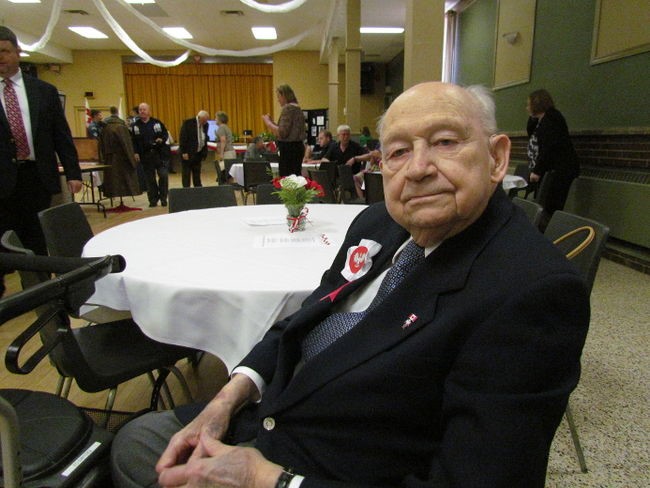by Paul Morden for the Sarnia Observer
(2014) When Krystyna Stalmach found her father’s war medals in an old shoebox, she wondered how many other Polish households in Sarnia had similar pieces of history stashed away.
That inspired several months of work creating displays of local artifacts, all leading up to Sunday’s Our History, Our Heroes event at the Polish Hall on Exmouth Street, held to honour the city’s Polish veterans of the Second World War.
“I’m glad they did this,” Sarnia Mayor Mike Bradley said before Sunday’s opening ceremony. Sarnia’s Polish combatants organization, made up of veterans who immigrated to the city after the fighting ended, was one of the largest in Canada, Bradley said. “The Polish community helped build Sarnia, after the Second World War,” he added.
Stalmach said a committee formed to preserve the local Polish community’s war history, and funds were raised by holding dinners, and applying to the county’s creative fund. “We received a lot of archival pictures, medals, you name it, and we organized them into shadow boxes,” she said.
Those framed collections were part of the display set up in the Polish Hall Sunday, and will be on public display again at this year’s Sarnia Artwalk, before they’re returned to the families. Sunday’s event also included displays about the Warsaw Uprising, the Normandy Campaign, the Battle of Monte Cassino, and other battles Polish soldiers were part of during the war.
Also there Sunday were some of Sarnia’s few remaining Polish veterans, including 93-year-old Ed Switocz, who fought in the Warsaw Uprising. “During the occupation, I joined the home army,” he said. Switocz was in Warsaw during 1944’s tragic 63-day uprising as the home army attempted to free the city from the Germans. “We surrendered in the centre of the city,” said Switocz, who was injured close to the end of the fighting.
He was taken prisoner by the Germans and later liberated in Bavaria by the U.S. Army, immigrating to Canada in late 1951 after a few years living and working in Holland, Switocz retired from Polysar in 1982, and raised three daughters with his wife in Sarnia. “I’m really speechless,” he said about Sunday’s display and the effort to preserve the history of the community’s connection to the war.
Emil Hojka, 91, lived in a region of Poland where he and other young men were drafted into the German army during the war. He was taken prisoner by New Zealand troops in Italy, and later accepted an offer to rejoin the war, fighting in the Second Polish Corps, alongside the British Army. He lived for a time in England after the war. “I was young and restless, and I decided to come to Canada,” Hojka said. He eventually found a job at Fibreglas, working there for 33 years, and he and his wife raised their family in Sarnia.
Stalmach said she hopes the project will encourage more families to uncover and preserve artifacts they find stashed away in garages and basements.
“We just want to save memories,” she said.


